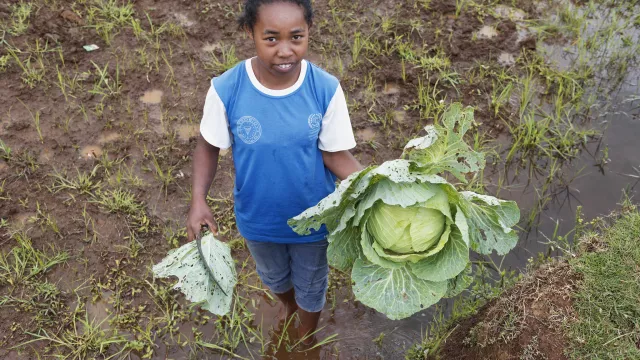Gender Equality and Inclusion

Overview
We will lead strategic, innovative research to advance gender equality, youth opportunities, and social inclusion within CGIAR’s Food, Land, and Water Systems Portfolio, aligning efforts to move CGIAR and our partners toward achieving gender equality and social inclusion.
The Accelerator plays a vital role in building an enabling external environment for gender equality and social inclusion research within food, land, and water systems. Our efforts will accelerate the growth and impact of gender equality and social inclusion, and will continue influencing the global discussion on gender equality and youth engagement.
Our goal
Our work aims to help
Where we work
Africa, Latin America, South Asia, Southeast Asia, Small Island Nations in the Pacific
Challenges
Challenges we’ll address
- Systemic, complex and deeply entrenched social inequalities and gender disparities in food, land, and water systems
- $10 trillion lost per year because of lack of investments on basic skills for women and in gender equality
- Widening income gap between men and women exarcerbated by the climate crisis, as households run by women lose US$53 billion per year more than men
- A pressing need for multi-actor, multi-sectoral, and evolutionary solutions to promote human right to gender equality and social inclusion
Areas of work
Accelerating Solutions for Impact
Through research with our partners, we will find solutions that lead to gender equality, and opportunities for youth and social inclusion in food-land-water systems. We will co-develop and inclusively scale integrated solutions that challenge the multiple dimensions of inequality, overcoming inclusion challenges specific to climate change adaptation and mitigation; agricultural technology design and use; breeding and genetic innovations; food-land-water value chains and market systems; natural resources management, such as of water, biodiversity and landscapes; and livestock, fisheries and aquaculture.

Accelerating Change through Evidence
We will focus on creating conducive conditions for rigorous, solution-oriented gender equality and social inclusion research by engaging with gender researchers, CGIAR, and food-land-water actors, and amplifying the influence and use of this research among relevant end users to contribute to wide-scale impact on gender equality, social inclusion and meaningful opportunities for the youth. Our work will be founded on CGIAR’s gender and youth work of past decades: the demand created, and the strong partnerships formed to collectively deliver on gender equality and social inclusion goals.

Our approach
Interlinked support across CGIAR’s portfolio
We will work closely with the Breeding for Tomorrow, Climate Action, Diets and Nutrition, Food Frontiers and Security, Multifunctional Landscapes, Policy Innovations, Scaling for Impact, and Sustainable Animal and Aquatic Foods programs.
Working to share our capacity with
- Gender researchers
- CGIAR senior leaders
- Biophysical and social science collaborators
Our expertise
- Significant experience on gender and inclusion research on food-land-water systems, across 14 research Centers worldwide
- 100+ scientists whose research focuses on the nexus of gender equality and social inclusion and food-land-water systems — a specialization that remains scarce in the FLWS ecosystem
- Our role as convenor of the largest global gender network in food-land-water systems researchers
- Our global network and deep relationships with partners and stakeholders across the world.
Events
News
-

From vision to impact: What closing the gender gap in STEM really means for Africa
Every year, we reaffirm our commitment to women and girls in science. We host panels, share statistics, and celebrate role models. These efforts...
-

CGIAR marks the International Day of Women and Girls in Science
CGIAR celebrates the voices and achievements of women whose work, leadership, and lived experience will inspire the next generation of scientists.
-

Reshaping youth aspirations in agrifood systems
Young people’s aspirations for gaining a greater income than their parents, and the barriers facing them in agriculture for achieving this, are not...
-

Why the MENA region needs a gender-responsive learning agenda
Addressing the intersecting challenges of climate change, conflict and inequality in the MENA region requires more than isolated interventions - it...


